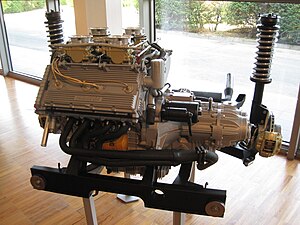Lamborghini V8
| Lamborghini V8 | |
|---|---|
 |
|
| Overview | |
| Manufacturer | Lamborghini |
| Production | 1971-1988 |
| Combustion chamber | |
| Configuration | 90° V8 petrol engine |
| Displacement |
2.0: 1,995 cc (121.7 cu in), 2.5: 2,463 cc (150.3 cu in), 3.0: 2,997 cc (182.9 cu in), 3.5: 3,485 cc (212.7 cu in) |
| Cylinder bore |
2.0: 77.4 mm (3.05 in) 2.5/3.0/3.5: 86.0 mm (3.39 in) |
| Piston stroke |
2.0/2.5: 53.0 mm (2.09 in) 3.0: 64.5 mm (2.54 in) 3.5: 75.0 mm (2.95 in) |
| Cylinder block alloy | Cast aluminium alloy |
| Cylinder head alloy | Cast aluminium alloy |
| Valvetrain | 2 valves per cylinder, 2.0/2.5/3.0: single overhead camshaft, 3.5: double overhead camshaft |
| Combustion | |
| Fuel type | Petrol/Gasoline |
| Oil system | Wet sump |
| Cooling system | Water cooled |
| Output | |
| Power output |
2.0: 136 kW (185 PS; 182 bhp) @ 7,800 rpm 2.5: 164 kW (223 PS; 220 bhp) @ 7,500 rpm, then 190 kW (258 PS; 255 bhp) 3.0: 186 kW (253 PS; 249 bhp) @ 7,500 rpm, or 194 kW (264 PS; 260 bhp) @ 7,500 rpm, or 198 kW (269 PS; 266 bhp) @ 7,800 rpm 3.5: 190 kW (258 PS; 255 bhp) @ 7,000 rpm |
| Specific power |
2.0: 68.2 kW (92.7 PS; 91.5 bhp) per litre 3.5: 54.5 kW (74.1 PS; 73.1 bhp) per litre |
| Torque output | 3.0: 273 N·m (201 lbf·ft) @ 5,750 rpm |
The Lamborghini V8 is a ninety degree (90°) V8 petrol engine designed by Lamborghini in the 1970s for their less-expensive vehicles. It was only the second internal combustion engine ever developed by the company, and first saw production for the 1971 Lamborghini Urraco. It was designed by Gian Paolo Dallara. The all-aluminium alloy engine was introduced as a 2.5-litre variant, displacing 2,463 cubic centimetres (150.3 cu in), but was expanded, by increasing the piston stroke to a 3.0-litre variant for 1975 - now displacing 2,997 cubic centimetres (182.9 cu in).
A 2.0-litre reduced-stroke version was also introduced in 1975 for sale in Italy, displacing 1,994 cubic centimetres (121.7 cu in), because of Italian legislation which imposed punitive taxes on cars whose engines displaced more than 2.0 litres.
This V8 engine was also used in two other models, the Lamborghini Silhouette in 1976-1977 in which it kept the 3.0-litre displacement, and the slightly updated replacement in 1982, the Lamborghini Jalpa, which saw the engine increased in size to 3.5 litres, displacing 3,485 cubic centimetres (212.7 cu in), for ease in meeting ever-tighter emissions requirements.
...
Wikipedia
